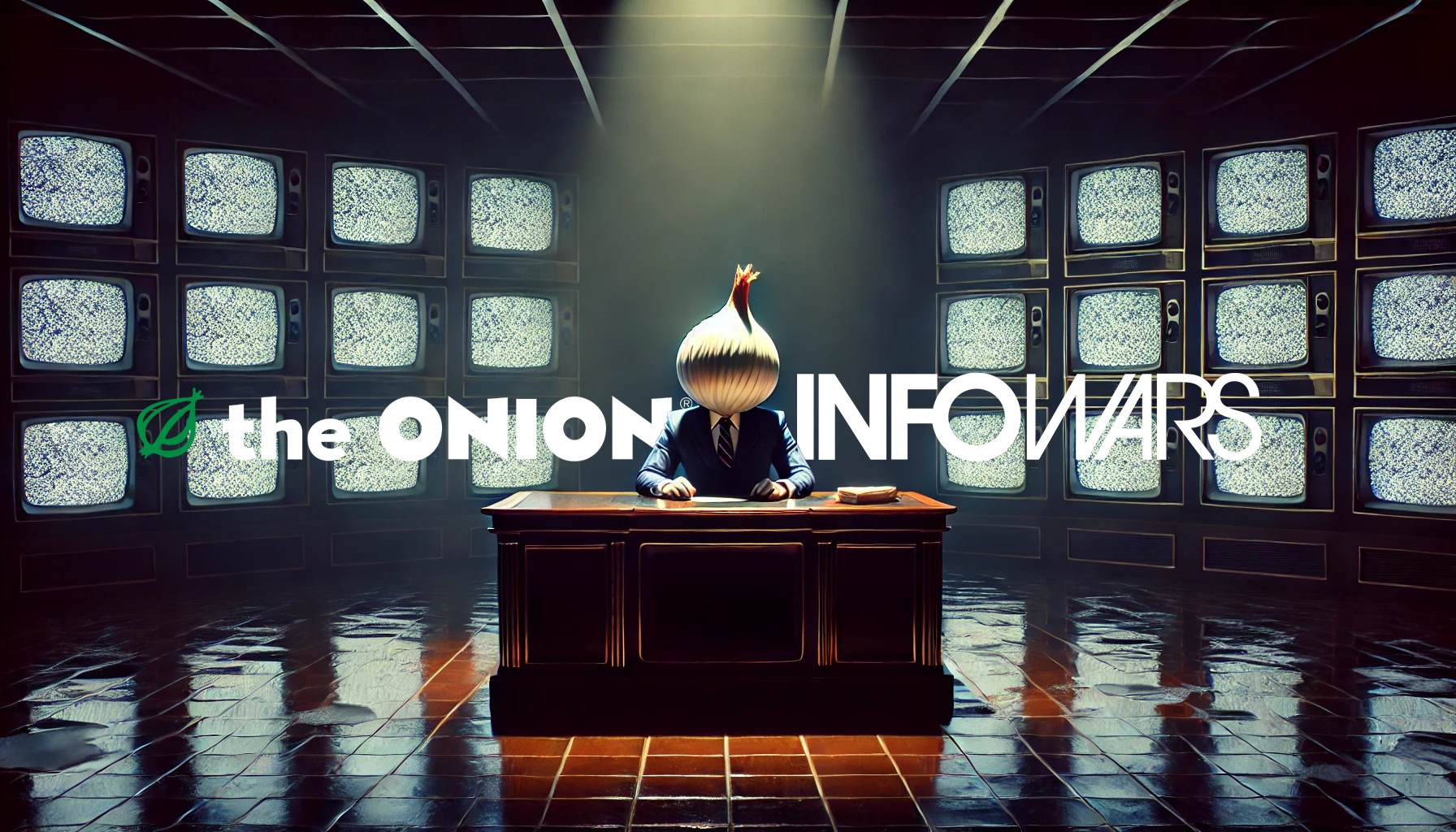Legal Disclaimer & Author Notes
The content of this blog post is for informational and entertainment purposes only and should not be construed as definitive claims or factual assertions about any individual, organization, or entity. All opinions expressed are solely those of the author, based on personal analysis and research at the time of writing.
It is worth noting that many of the videos and articles referenced in this post were readily available during the initial research phase but have since been removed or wiped from the internet. This observation underscores the central theme of this article: that the acquisition of InfoWars by The Onion might be interpreted as an effort to reshape narratives or obscure certain historical content.
While this post seeks to encourage thoughtful discussion, no allegations or accusations are intended toward any parties mentioned. The author does not guarantee the completeness, accuracy, or reliability of the information provided, as the landscape of available resources has shifted over time.
Readers are encouraged to critically assess the content and draw their own conclusions. By continuing to read, you acknowledge that this post is a personal expression, protected under applicable laws, and should not be relied upon as an authoritative or definitive source.
In a twist almost too ironic to be true, The Onion, the internet’s leading satirical news site, has reportedly “bought out” Alex Jones’ Infowars following its bankruptcy. To fans of dark humor, it’s an obvious punchline: The Onion, known for making light of serious topics, now controls one of the most controversial conspiracy-focused media outlets. But beneath the humor, this acquisition might add a new “layer” to Jones’ truth—one that could obscure key issues he’s spotlighted. For all his bombast, Jones occasionally exposed real issues that have since gained mainstream credibility. So, could The Onion’s acquisition be a strategic move to mock or dismiss these moments?
Adding to the intrigue is a strange theory: some speculate that Alex Jones may be the reincarnated persona of comedian Bill Hicks, who shared Jones’ contempt for media manipulation, elite power, and societal hypocrisy. Though this theory sounds outlandish, certain parallels are compelling.
Here, I’ll explore the surprising truths Jones revealed, the peculiar Bill Hicks connection, and what The Onion’s acquisition could mean for his legacy in an era where satire holds real power to reshape public memory.
The “Truths” Alex Jones Was Sometimes Right About
Alex Jones built his Infowars empire on a foundation of bombastic claims and conspiracy theories. Though many of these theories seem extreme, several have been surprisingly prescient. This section delves into the list of topics Jones addressed that later showed elements of truth, sometimes years after he sounded the alarm.

Bohemian Grove and Elite Rituals (2000)
In 2000, Jones infiltrated Bohemian Grove, a private annual gathering of the global elite. With his camera, he documented a bizarre ceremony known as the “Cremation of Care,” which involved a symbolic ritual before a large owl effigy. While initially dismissed as absurd, the footage underscored the reality of secret gatherings and rituals among influential figures.
Video: Watch Jones’ Bohemian Grove footage here. (Video has been scrubbed by YouTube)
The Rockefeller Foundation’s “Operation Lockstep” and Pandemic Control (2010)
In 2010, the Rockefeller Foundation published a report titled Scenarios for the Future of Technology and International Development, which included a scenario called “Lockstep.” This hypothetical scenario imagined a world dealing with a severe pandemic. It described strict government lockdowns, mandated health protocols, surveillance measures, and centralized control of resources—steps taken to maintain order and protect public health. To Jones and his supporters, the “Lockstep” scenario seemed eerily prescient when the COVID-19 pandemic led to similar measures globally.
Jones argued that the Rockefeller Foundation’s hypothetical scenarios weren’t mere fiction but possible frameworks or “game plans” for future governmental responses, intended to centralize power under the guise of public safety. Critics of lockdowns and mandates saw the resemblance to “Lockstep” as confirmation of Jones’ warning that governments would use pandemics as pretexts for control. While the scenario was never an actual plan, it raised questions about how prepared governments are to leverage crises to introduce widespread surveillance and public control.
Document: Read the original Lockstep document.
Big Pharma and the Opioid Crisis (Early 2000s – Present)
Jones has long claimed that pharmaceutical companies prioritize profits over patient welfare, manipulating healthcare policies to increase their market dominance. This argument gained new weight during the opioid crisis, where companies like Purdue Pharma were found responsible for aggressive marketing practices that fueled widespread addiction. Investigations showed that Purdue and other companies downplayed addiction risks, targeted doctors, and promoted painkillers to boost sales, despite the public health risks.
Jones argued that Big Pharma’s influence extends beyond opioids, impacting everything from drug pricing to vaccine development, with profit as the primary motivator. This criticism resonated as lawsuits and fines brought attention to the pharmaceutical industry’s practices, revealing that companies had long wielded considerable influence over healthcare policy, often at the expense of public health.
Source: ProPublica’s report on Big Pharma influence.
NSA Surveillance of American Citizens (2001 – Present)
In the wake of 9/11, Jones warned that the U.S. government would use the threat of terrorism as a justification to implement mass surveillance on its citizens. In 2013, whistleblower Edward Snowden leaked classified NSA documents that exposed the scale of government monitoring, confirming that millions of Americans were subject to surveillance without warrants or oversight. Snowden’s revelations substantiated Jones’ fears of government intrusion and raised serious concerns about the erosion of privacy rights.
Snowden’s leaks showed how the NSA, through programs like PRISM, had gained direct access to data from tech giants like Google and Facebook. The leaks turned the spotlight on secretive government practices that many had suspected but were unable to prove. Jones viewed this as proof of an expanding “surveillance state,” where the government could access personal information on a massive scale under the guise of national security.
Video: Watch Snowden discuss NSA surveillance. (Video has been scrubbed by YouTube)
Environmental Chemicals and the “Gay Frogs” Claim (Early 2000s)
Jones’ infamous “gay frogs” claim drew ridicule, but it was based on real research into the effects of atrazine, a widely used herbicide, on amphibian populations. Studies by UC Berkeley scientist Dr. Tyrone Hayes demonstrated that atrazine could disrupt endocrine systems in frogs, causing gender changes and reproductive issues. Hayes’ work was pivotal in raising awareness about the impact of industrial chemicals on the environment and species development.
Jones often used the “gay frogs” claim to highlight the broader issue of unregulated chemicals affecting ecosystems and public health. Atrazine’s hormonal impact on frogs underscored how environmental pollutants could disrupt natural processes, and Jones cited it as proof of the dangers posed by chemical exposure. Although Jones’ framing was often sensational, atrazine remains a debated issue, with studies linking it to potential risks for both wildlife and humans.
Source: UC Berkeley’s study on atrazine’s impact on frogs.
The Bilderberg Group and Elite Influence (2000s – Present)
Jones has consistently highlighted the Bilderberg Group as an elite collective shaping global policy away from the public eye. The Bilderberg meetings, established in 1954, bring together leaders from politics, business, media, and academia for private discussions. While the group argues that these gatherings foster open dialogue without the pressure of public scrutiny, Jones claims the secrecy serves as a breeding ground for elite agendas that lack accountability.
Jones argues that these meetings allow powerful individuals to influence policy on issues ranging from economic globalization to foreign relations, without democratic oversight. While much of the speculation about Bilderberg is exaggerated, the meetings raise questions about the influence of unelected elites on global decision-making, especially given the powerful attendees from across sectors.
Video: Documentary on the influence of the Bilderberg Group. (Video has been scrubbed by YouTube)
Agent Provocateurs and Controlled Protest Infiltration (2001 – Present)
Jones has often claimed that protests, including the WTO protests in Seattle and later the January 6th Capitol riot, are infiltrated by provocateurs whose goal is to incite violence, discredit activists, or justify police crackdowns. After the WTO protests in 1999, investigations revealed that law enforcement used undercover agents who may have escalated tensions. Similarly, reports about January 6th suggest possible involvement of informants and undercover operatives, fueling claims of manipulation.
Jones argues that these provocateurs allow governments to label peaceful protests as violent, creating a pretext for increased security measures. His claims, while contentious, are rooted in a long history of documented cases where authorities used provocateurs to undermine social movements or control public perception.
Source: Read analysis on agent provocateurs in social movements.
The 9/11 “Inside Job” Theory (2001)
Jones was among the earliest figures to question the official narrative of 9/11, claiming potential government complicity or negligence. He speculated that the U.S. government might have orchestrated or at least allowed the attacks as a justification for foreign interventions and domestic surveillance. While there’s no evidence supporting an orchestrated attack, the 9/11 Commission later exposed significant intelligence failures and missed opportunities to prevent the attacks.
Jones’ theory contributed to broader questions about the government’s role in protecting national security and highlighted the potential for institutional lapses to cause far-reaching consequences. His criticism, although extreme, underscored the need for accountability in handling security information, especially in the face of known threats.
The Jeffrey Epstein Scandal and Elite Sexual Exploitation Networks (2000s – 2019)
Jones claimed for years that elites were involved in hidden exploitation networks. The 2019 arrest and subsequent death of Jeffrey Epstein, a financier with powerful connections and a history of sex trafficking, brought some legitimacy to Jones’ concerns. Epstein’s connections to high-profile individuals and evidence of his exploitation network revealed disturbing truths about elite circles and abuse.
Epstein’s case highlighted systemic issues within the criminal justice system, raising questions about the extent of protection and privilege granted to the powerful. To Jones, the Epstein case confirmed his fears of “hidden networks” operating above the law, with influence that could evade accountability until public scrutiny intervened.
Documentary: Netflix’s “Jeffrey Epstein: Filthy Rich”.
Vaccine Mandates and Government Control (2020 – Present)
Jones has long opposed mandatory vaccination, viewing it as a potential government tool for control. During the COVID-19 pandemic, the introduction of vaccine mandates and “vaccine passports” brought his warnings into mainstream debates. While vaccine requirements are often grounded in public health goals, Jones argued that such mandates could lead to restrictions on individual freedoms and set precedents for future government overreach.
The vaccine debate raised ethical questions about individual autonomy, public safety, and the role of government in healthcare decisions. Jones’ stance, though controversial, reflects broader discussions about the balance between personal freedom and collective health responsibilities.
Harvesting of Fetal Tissue and Organ Sales (2015 – Present)
Jones claimed that fetal tissue was being harvested unethically, a claim dismissed until the release of undercover videos by the Center for Medical Progress in 2015. These videos allegedly captured Planned Parenthood executives discussing the sale of fetal tissue for research, which sparked public outrage and regulatory scrutiny.
Jones argued that these practices were part of a broader ethical erosion within medical research. The controversy surrounding these videos raised questions about the boundaries of medical ethics and the role of consent in research practices, giving some credibility to Jones’ critique of fetal tissue usage in scientific research.
Video: Center for Medical Progress’ undercover videos.
False Flag Operations and Psychological Warfare (2001 – Present)
Jones often refers to “false flag” operations, where governments allegedly stage attacks or incidents to manipulate public opinion. Though many of Jones’ claims are unproven, historical events like the Gulf of Tonkin incident, where the U.S
. misrepresented facts to justify escalating the Vietnam War, lend some credence to his suspicions. False flags, Jones argues, serve as psychological warfare tactics to sway public opinion or justify military action.
Jones’ fixation on false flags reflects broader anxieties about government transparency and manipulation, especially in times of war or crisis. While his claims lack evidence in many cases, the concept of false flags remains relevant in discussions of government influence over public perception.
COVID-19 Origin and Gain-of-Function Research (2020 – Present)
Jones speculated early on that COVID-19 could have originated from gain-of-function research in a lab, an idea initially dismissed but later considered plausible by some scientists and intelligence agencies. The “lab-leak hypothesis” has since gained traction as a possible origin scenario, prompting investigations into biosecurity protocols and scientific oversight.
The gain-of-function debate touches on ethical concerns around scientific experimentation and risk management. Jones’ suspicions reflect a broader mistrust of powerful institutions and the potential dangers of unchecked research, highlighting the importance of transparency and accountability in scientific practices.
Article: The Wall Street Journal’s report on COVID-19 lab origins.
Government-Controlled Media and Propaganda (2000s – Present)
Jones frequently argues that mainstream media collaborates with the government to promote specific narratives. Historical examples, like the CIA’s Operation Mockingbird—a covert operation to influence media in the 20th century—support some of his concerns. Although Jones often generalizes, the notion that media can serve as a propaganda tool has historical precedent, raising concerns about media independence and influence.
Operation Mockingbird underscores Jones’ point about media manipulation, highlighting how governmental influence over news outlets can shape public perception. Jones’ fears about media bias echo contemporary debates on media ownership, censorship, and information integrity.
The Pedophile Networks Conspiracy (Pizzagate to Epstein)
Although Jones’ involvement in “Pizzagate” was widely criticized, his broader claims about pedophilia within elite circles found uncomfortable validation with Epstein’s case. Epstein’s network, connected to powerful individuals, revealed that exploitation could indeed occur within elite circles shielded from scrutiny. Jones’ stance remains divisive, but Epstein’s conviction highlighted the potential for abuse within protected spheres of influence.
Jones’ continued emphasis on hidden networks, while often extreme, reflects a distrust of elite accountability. Epstein’s case demonstrated that power and privilege can obscure criminal activity, lending an unsettling resonance to Jones’ warnings about unchecked elite behavior.
Sandy Hook and Public Access Restrictions
Jones’ controversial statements about Sandy Hook have drawn intense backlash. His questions around sealed case files, restricted photos, and the quick demolition of the school raised doubts among his followers, who felt the handling of Sandy Hook was different from other tragedies. Although Jones faced legal action for these claims, his supporters argue that transparency in such events is crucial for public trust.
Jones’ theories, though widely condemned, highlight the need for openness and consistency in public crisis management. His fixation on Sandy Hook is divisive, yet it points to a broader public skepticism toward secrecy around high-profile incidents.
The Eerie Alex Jones–Bill Hicks Connection
Among conspiracy theories surrounding Alex Jones, one of the most unusual is that he’s actually the late comedian Bill Hicks. Though Jones himself has denied this claim, certain parallels between him and Hicks are intriguing enough to keep the theory alive. Here’s a complete look at the details that fuel this speculation:

Video: Watch Booth discussing Jones here. (Video has been blocked by WMG, of course.)
Shared Friendship and Partnership with Producer Kevin Booth
Bill Hicks and Alex Jones both share a strong connection with Kevin Booth, a Texas-based comedian and filmmaker who was one of Hicks’ closest friends and creative partners. Booth directed multiple Hicks projects and later worked with Jones on Infowars, producing segments and collaborating on content. Fans see Booth’s ongoing partnership as a link that could imply Jones is continuing Hicks’ legacy.
Link: More on Booth’s partnership with Hicks.
Striking Physical Resemblance
One of the most common points made by believers of the theory is the physical similarity between Hicks and Jones. Fans highlight their nearly identical height, build, and hairline, as well as facial features like moles and bone structure. This resemblance has sparked numerous side-by-side photo comparisons online, and for some, the likeness alone is enough to fuel the theory that Jones is Hicks in disguise.
Image: Comparison of Hicks and Jones.
Explosive Outbursts and Similar Mannerisms
Hicks and Jones are both known for their intense delivery styles. Hicks’ comedy was marked by loud, impassioned rants about society, government, and media manipulation, a trait Jones shares in his own presentations. Both men also share a tendency to employ hyperbole, irony, and dark humor in their critiques of authority and culture, giving fans further reason to suspect a hidden connection between them.
Video: Watch a compilation of Hicks’ and Jones’ similar on-stage outbursts.
Shared Focus on Anti-Establishment and Elite Manipulation Themes
Hicks often tackled topics that questioned authority, criticized the government, and mocked societal complacency. His material explored conspiracy-adjacent ideas about media propaganda, government surveillance, and societal conditioning—topics Jones also covers but with a more literal and intense approach. This thematic overlap makes fans wonder if Jones could be continuing Hicks’ line of questioning, albeit in a more extreme style.
Timeline Gaps and Plausibility of Reinvention
Bill Hicks tragically passed away from cancer in 1994, and Alex Jones gained fame in 1997. This three-year gap has provided space for speculation that Hicks, perhaps disillusioned with mainstream comedy, reinvented himself as Jones to become a provocateur in a new, more direct way. Although far-fetched, the timeline aligns neatly enough to keep theorists intrigued.
Link: Bill Hicks on Wikipedia.
Identical Facial Markings: Moles and Scars
Both Hicks and Jones have distinct facial markings. Hicks had a mole on his cheek, while Jones has a similar mark in the same spot. For some, this is seen as a physical “clue” that Jones may be Hicks in disguise, a theory further fueled by side-by-side photo analysis online.
Image: Mole and scar comparison here.
Hicks’ Final TV Appearance and the Waco Connection
Hicks’ last televised segment covered the Waco Siege, an event that would later become a significant topic for Jones. Hicks’ final appearance delved into government overreach and media influence, themes Jones picked up just a few years later as he began discussing the Waco incident. This shared focus on Waco, coupled with the timing of Hicks’ passing and Jones’ rise, has added to the theory’s intrigue.
Video: Hicks on Waco.
An Honorary Plaque Commemorating Hicks Presented to Jones
Kevin Booth, who was close with Hicks and later partnered with Jones, once presented Jones with an honorary plaque commemorating Hicks. Given their supposed lack of a personal connection, this gesture struck some fans as peculiar, fueling further rumors about a hidden connection or passing of the torch from Hicks to Jones.
What The Onion’s Ownership of Infowars Could Mean
On the surface, The Onion’s acquisition of Infowars might seem like an ironic twist in the world of satire. But beyond the humor, this buyout could actually function as a form of what some might call “satirical censorship,” using comedy to erase the complexities of Jones’ legacy. This isn’t just about making fun of a controversial figure; it’s about the potential power of satire to control narratives, influence public perception, and even alter the collective memory of issues that may merit genuine discourse.
Turning Critique into Comedy
While Bill Hicks used satire to push audiences toward deeper truths, The Onion could be leveraging satire as a way to reduce serious topics to mere punchlines. When controversial subjects like government surveillance or pharmaceutical influence are reframed as part of a comedic narrative, there’s a risk of trivializing these topics, making them seem absurd or unworthy of serious discussion. Jones, for all his flaws, often pointed to issues of elite control, media manipulation, and personal privacy that resonated with audiences. If The Onion turns these concerns into satire, it may lead the public to dismiss them outright.
By making Jones’ concerns laughable, The Onion could inadvertently—or intentionally—erase important elements of his work. Surveillance, for example, was a frequent topic for Jones, especially after Edward Snowden’s revelations about the NSA. But if The Onion frames this as one of Jones’ “outrageous” obsessions, they might reduce a complex issue to a simple joke about “paranoid conspiracy.” As a result, audiences may be less likely to take these issues seriously in the future, overlooking real concerns in favor of a laugh.
Shaping Public Memory Through Humor
Satire holds the power to shape public perception subtly, often without the audience realizing it. By taking control of Infowars and rebranding it as a satirical platform, The Onion can effectively reshape the narrative around Jones’ most discussed topics. Casting them as absurd or outlandish could lead audiences to dismiss these subjects altogether, undermining any real insights Jones may have offered. For instance, Jones’ work on environmental issues—such as chemical pollution and its effect on amphibian populations—may be rewritten in the public mind as nothing more than his infamous “gay frogs” claim, reduced to a funny punchline rather than a topic rooted in environmental science.
This process can be likened to historical revisionism through satire. Just as jokes about serious topics can obscure the truth, The Onion’s ownership of Infowars might reshape the way people remember Alex Jones’ work and, by extension, the issues he discussed. Humor, especially satire, has a way of altering collective memory, often simplifying or minimizing events or ideas to fit a laughable narrative. With The Onion at the helm, Jones’ concerns about corporate power, governmental control, or public health may become lost in a blur of absurdity, weakening any remaining influence these ideas hold in the public sphere.
Are We Laughing Off Hard Truths?
Traditionally, satire has been a tool to challenge norms and expose societal flaws. But when wielded by a major media platform, satire can also obscure issues, distract from important discussions, and even desensitize audiences to real concerns. In The Onion’s hands, Infowars’ most controversial content risks being reduced to running gags, which might ultimately numb audiences to serious issues.
Oversimplifying Real Concerns
The Onion’s approach risks trivializing the complex issues that Jones occasionally brought to light. While Jones’ delivery was often extreme, he did touch on some real-world concerns—issues that affect people globally, like elite power structures, government surveillance, and pharmaceutical influence. If these topics are reduced to caricature, audiences may view them as little more than conspiracy theories unworthy of critical thought, overshadowing any nuanced points Jones might have raised.
For example, consider Jones’ warnings about Big Pharma’s influence on public health policy. While some of his critiques were exaggerated, the core concern about pharmaceutical companies prioritizing profits over public welfare has been validated, especially in the wake of the opioid crisis. However, if The Onion turns this into a joke about Jones’ “fear-mongering,” it may distract from the real and documented influence of Big Pharma, causing audiences to dismiss legitimate discussions as mere fear-based rhetoric.
Satire as Distraction
By framing Jones’ work as comedy, The Onion risks distracting audiences from genuine societal issues. This distraction can be subtle yet powerful. In a world where many are already overwhelmed by information, reducing complex ideas to punchlines can create a barrier to deeper understanding. Instead of sparking conversation about the validity of Jones’ claims on surveillance or corporate control, The Onion might reduce these topics to running jokes, encouraging viewers to laugh rather than reflect.
Furthermore, satire in the hands of a major platform can serve as a gatekeeper of acceptable discourse. If The Onion reshapes Jones’ work into easily dismissible content, it effectively decides what is “worthy” of public concern and what isn’t. For instance, Jones’ arguments about elite secrecy, as seen with his coverage of Bohemian Grove, may be reframed as the ravings of a paranoid personality, even though elite influence on policy is a documented reality. As audiences laugh, they might lose sight of the genuine questions Jones raised about transparency, power, and public access to truth.
Conclusion: Conspiracy + Satire = Censorship
In the end, I believe The Onion’s acquisition of Infowars is more than just a punchline—it’s a strategic move that could potentially reshape how we remember Alex Jones and the issues he spotlighted. While Jones is undoubtedly an extreme figure, he occasionally highlighted topics that resonate with real public concerns. By adding a “layer” of satire to Jones’ work, The Onion might obscure important questions about power, privacy, and influence. In a media landscape where the lines between entertainment and reality are increasingly blurred, perhaps this buyout is less funny—and more consequential—than it seems.
By laughing off hard truths, we risk ignoring them altogether, losing an opportunity to engage with the layered realities of our world. As The Onion repurposes Infowars into satire, audiences may be left with a diluted version of Jones’ legacy, one that obscures rather than illuminates the truths that might deserve serious consideration.








